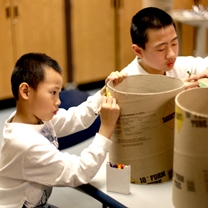 |
|
Grantee
Grant
Pictured
|
|
Contact
Website
|
“Queens Makes helped to diversify the maker movement in the community and create deep and lasting connections with local families. In the process, we’ve introduced a new learning approach to visitors, maker partners, the larger community, and even our own staff.”
-- David Wells, Manager of Creative Learning and Making,
New York Hall of Science
The New York Hall of Science (NYSCI), located in the most ethnically diverse county in the nation, Queens, N.Y., serves the most diverse population of any science center in the country. Its interactive exhibits and workshops allow visitors to experience hands-on learning in science, technology, engineering, and math. Creating a program called NYSCI Neighbors to engage underserved populations in its community, the museum offered local families opportunities to participate in afterschool programs and workshops, with perks including free membership cards and access to the Science Playground.
With a 2011 Museums for America grant, NYSCI sought to grow its NYSCI Neighbors community connections, and strengthen its ties to the Queens maker community. The goal was to enrich the quality of its programming and build a new pool of talent. Queens Makes presented weekend programming targeting the local Latino, Asian, and Caribbean communities. The programs encouraged participants to engage with the museum as a place to showcase their passions and talents. NYSCI also used Queens Makes as a launching pad to develop new approaches and improve its infrastructure through data collection, surveys, interim reports, and user feedback. Further, NYSCI and its neighborhood partner, Queens Museum of Art, promoted repeat visits to micro and macro communities in the maker world by leveraging their relationships and information gained from Queens Makes.
Engaging Communities and Growing a Generation of STEM Leaders
The grant allowed NYSCI to implement maker programming, which let visitors take on the role of producers rather than consumers within the walls of the science center. To kick off the program, NYSCI engaged 60 Chinese and Latino families in workshops in a variety of topics, including drum making, exploring the mechanics of dragon boats (in conjunction with the Hong Kong Dragon Boat Festival in the local park), and cultural influences on design. One workshop led to an impromptu performance by the young drummers.
A program called Little Makers offered families with younger children a curriculum for experimenting with materials and design. In the classes, the Little Makers and their families created block prints, learned the science behind bubbles, and made ice cream. Weekend workshops delved into circuitry, engineering tools, building projects, and the creation of large and small open-ended structures to teach students about the impact of scalability. Over the past two years, families introduced to NYSCI through Queens Makes have become regular visitors, and many students have expressed excitement about using materials and tools. Teens voiced their interests in areas as varied as 3D printing, music, and game controls; discussed their process; and provided feedback for future programs in the Speak Up Space video diary booth. Their ability to articulate their experiences demonstrated that they understood the processes and materials, and could apply them in many different ways.
NYSCI also used the grant to develop an advisory board to create opportunities to cultivate relationships with makers and their networks. Slated to host the upcoming World Maker Faire, an event featuring innovation and experimentation across the spectrum of science, engineering, art, performance, and craft, NYSCI used its advisory board to connect with the event leaders and maker culture representatives from New York and around the nation. NYSCI also hosted symposia convening national leaders in conversations about learning and engagement as they relate to young people’s passions for making. Other maker resources, like local Queens artist and maker Nick Normal, consulted with NYSCI to help develop and introduce new projects and recruit NYSCI Neighbors participants from their networks.
An Institution Adopting the Maker Mindset
The Queens Makes team used the project to inform strategy and education approaches throughout NYSCI. They also used it as an opportunity to enhance communication and collaboration across departments. Through maker projects, NYSCI is constantly developing new activities and workshops for materials investigations. This is made possible by the new discovery approach evolved during the program, rather than the previous method, using tools as a means to end. By providing emergent learning experiences centered on visitors’ interests, families were afforded the opportunity to explore their creative potential. This open-ended framework exposed NYSCI makers to the vast potential of tools. The results enabled makers, participants and staff to see firsthand how removing structure can spark creativity, inventiveness, and innovation.
This mindset was integrated into NYSCI’s program development process. On the third weekend of each month, NYSCI hosts Wildcard Weekend, where guest makers collaborate with families through a day of feedback, conversations, and interactions with prototypes. This interface sparks ideas for future programming. For example, a Wildcard Weekend project tinkered with the process of developing a primitive robot called a Brush Bot, and NYSCI is now developing these elements into a month-long theme incorporating exploration into brush, circuitry, and power source mechanics.
The museum developed a community of practice in which these observations, as well as the data and feedback collected through Queens Makes, were shared with cultural institutions across the country through conferences, reports, and communication within NYSCI’s new networks. NYSCI also continues to study other institutions’ use of similar types of programming and has embedded itself into the strong global maker culture. The key lessons that the Queens Makes team took away from the project are reflective of the premise that NYSCI advocated to its visitors: the best lessons and discoveries are often found outside of an academic, or even purposeful, setting. As David Wells, Manager of Creative Learning and Making, said, “Give credit to informal education and unconventional ways of learning. And give yourself credit for making.”